Papers by Judit Kumuthini
The Lancet Global Health, Sep 1, 2023
EThOS - Electronic Theses Online ServiceGBUnited Kingdo
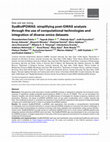
Bioinformatics
Motivation Post-genome-wide association studies (pGWAS) analysis is designed to decipher the func... more Motivation Post-genome-wide association studies (pGWAS) analysis is designed to decipher the functional consequences of significant single-nucleotide polymorphisms (SNPs) in the era of GWAS. This can be translated into research insights and clinical benefits such as the effectiveness of strategies for disease screening, treatment and prevention. However, the setup of pGWAS (pGWAS) tools can be quite complicated, and it mostly requires big data. The challenge however is, scientists are required to have sufficient experience with several of these technically complex and complicated tools in order to complete the pGWAS analysis. Results We present SysBiolPGWAS, a pGWAS web application that provides a comprehensive functionality for biologists and non-bioinformaticians to conduct several pGWAS analyses to overcome the above challenges. It provides unique functionalities for analysis involving multi-omics datasets and visualization using various bioinformatics tools. SysBiolPGWAS provide...
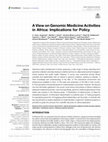
Frontiers in Genetics
Genomics policy development involves assessing a wide range of issues extending from specimen col... more Genomics policy development involves assessing a wide range of issues extending from specimen collection and data sharing to whether and how to utilize advanced technologies in clinical practice and public health initiatives. A survey was conducted among African scientists and stakeholders with an interest in genomic medicine, seeking to evaluate: 1) Their knowledge and understanding of the field. 2) The institutional environment and infrastructure available to them. 3) The state and awareness of the field in their country. 4) Their perception of potential barriers to implementation of precision medicine. We discuss how the information gathered in the survey could instruct the policies of African institutions seeking to implement precision, and more specifically, genomic medicine approaches in their health care systems in the following areas: 1) Prioritization of infrastructures. 2) Need for translational research. 3) Information dissemination to potential users. 4) Training program...

Polygenic risk score (PRS) analysis is a powerful method been used to estimate an individual’s ge... more Polygenic risk score (PRS) analysis is a powerful method been used to estimate an individual’s genetic risk towards targeted traits. PRS analysis could be used to obtain evidence of a genetic effect beyond Genome-Wide Association Studies (GWAS) results i.e. when there are no significant markers. PRS analysis has been widely applied to investigate the genetic basis of several traits including rare diseases. However, the accuracy of PRS analysis depends on the genomic data of the underlying population. For instance, several studies showed that obtaining higher prediction power of PRS analysis is challenging for non-Europeans. In this manuscript, we reviewed the conventional PRS methods and their application to sub-saharan Africa communities. We concluded that the limiting factor of applying PRS analysis to sub-saharan populations is the lack of sufficient GWAS data. Also, we recommended developing African-specific PRS tools. keywords Prediction medicine, GWAS, post-GWAS, PRS analysis,...
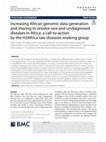
Orphanet Journal of Rare Diseases
The rich and diverse genomics of African populations is significantly underrepresented in referen... more The rich and diverse genomics of African populations is significantly underrepresented in reference and in disease-associated databases. This renders interpreting the Next Generation Sequencing (NGS) data and reaching a diagnostic more difficult in Africa and for the African diaspora. It increases chances for false positives with variants being misclassified as pathogenic due to their novelty or rarity. We can increase African genomic data by (1) making consent for sharing aggregate frequency data an essential component of research toolkit; (2) encouraging investigators with African data to share available data through public resources such as gnomAD, AVGD, ClinVar, DECIPHER and to use MatchMaker Exchange; (3) educating African research participants on the meaning and value of sharing aggregate frequency data; and (4) increasing funding to scale-up the production of African genomic data that will be more representative of the geographical and ethno-linguistic variation on the contin...

Human Genetics
Genomic medicine aims to improve health using the individual genomic data of people to inform car... more Genomic medicine aims to improve health using the individual genomic data of people to inform care. While clinical utility of genomic medicine in many monogenic, Mendelian disorders is amply demonstrated, clinical utility is less evident in polygenic traits, e.g., coronary artery disease or breast cancer. Polygenic risk scores (PRS) are subsets of individual genotypes designed to capture heritability of common traits, and hence to allow the stratification of risk of the trait in a population. We systematically reviewed the PubMed database for unequivocal evidence of clinical utility of polygenic risk scores, using stringent inclusion and exclusion criteria. While we identified studies demonstrating clinical validity in conditions where medical intervention based on a PRS is likely to benefit patient outcome, we did not identify a single study demonstrating unequivocally such a benefit, i.e. clinical utility. We conclude that while the routine use of PRSs hold great promise, translat...
2021 Sixth International Conference on Fog and Mobile Edge Computing (FMEC), 2021

Journal of Personalized Medicine
Genomics data are currently being produced at unprecedented rates, resulting in increased knowled... more Genomics data are currently being produced at unprecedented rates, resulting in increased knowledge discovery and submission to public data repositories. Despite these advances, genomic information on African-ancestry populations remains significantly low compared with European- and Asian-ancestry populations. This information is typically segmented across several different biomedical data repositories, which often lack sufficient fine-grained structure and annotation to account for the diversity of African populations, leading to many challenges related to the retrieval, representation and findability of such information. To overcome these challenges, we developed the African Genomic Medicine Portal (AGMP), a database that contains metadata on genomic medicine studies conducted on African-ancestry populations. The metadata is curated from two public databases related to genomic medicine, PharmGKB and DisGeNET. The metadata retrieved from these source databases were limited to genom...
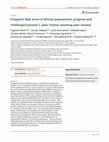
F1000Research
Polygenic Risk Score (PRS) analysis is a method that predicts the genetic risk of an individual t... more Polygenic Risk Score (PRS) analysis is a method that predicts the genetic risk of an individual towards targeted traits. Even when there are no significant markers, it gives evidence of a genetic effect beyond the results of Genome-Wide Association Studies (GWAS). Moreover, it selects single nucleotide polymorphisms (SNPs) that contribute to the disease with low effect size making it more precise at individual level risk prediction. PRS analysis addresses the shortfall of GWAS by taking into account the SNPs/alleles with low effect size but play an indispensable role to the observed phenotypic/trait variance. PRS analysis has applications that investigate the genetic basis of several traits, which includes rare diseases. However, the accuracy of PRS analysis depends on the genomic data of the underlying population. For instance, several studies show that obtaining higher prediction power of PRS analysis is challenging for non-Europeans. In this manuscript, we review the co...
Welcome to the H3ABioNet Help Desk user satisfaction survey! Thank you for taking part in this im... more Welcome to the H3ABioNet Help Desk user satisfaction survey! Thank you for taking part in this important survey to measure user satisfaction for the H3ABioNet Bioinformatics Help Desk (http://www.h3abionet.org/support). The H3ABioNet Bioinformatics Help Desk provides access to experts from a variety of domains to help answer any bioinformatics-related questions and provide support to various H3Africa and non-H3Africa projects that might be struggling with the analysis and planning of their experiments. The following survey aims to evaluate the service provided by the Help Desk and identify features to be improved and should only take a few minutes. Please be assured that all responses will be annonymized. By continuing with the survey you give your consent for the use of the annonymized data to be analysed and published.

A shortage of practical skills and relevant expertise is possibly the primary obstacle to social ... more A shortage of practical skills and relevant expertise is possibly the primary obstacle to social upliftment and sustainable development in Africa. The “omics ” fields, especially genomics, are increasingly dependent on the effective interpretation of large and complex sets of data. Despite abundant natural resources and population sizes comparable with many first-world countries from which talent could be drawn, countries in Africa still lag far behind the rest of the world in terms of specialized skills development. Moreover, there are serious concerns about disparities between countries within the continent. The multidisciplinary nature of the bioinformatics field, coupled with rare and depleting expertise, is a critical problem for the advancement of bioinformatics in Africa. We propose a formalized matchmaking system, which is aimed at reversing this trend, by introducing the Knowledge Transfer Programme (KTP). Instead of individual researchers travelling to other labs to learn,...
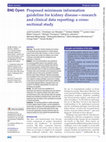
BMJ Open
ObjectiveThis project aimed to develop and propose a standardised reporting guideline for kidney ... more ObjectiveThis project aimed to develop and propose a standardised reporting guideline for kidney disease research and clinical data reporting, in order to improve kidney disease data quality and integrity, and combat challenges associated with the management and challenges of ‘Big Data’.MethodsA list of recommendations was proposed for the reporting guideline based on the systematic review and consolidation of previously published data collection and reporting standards, including PhenX measures and Minimal Information about a Proteomics Experiment (MIAPE). Thereafter, these recommendations were reviewed by domain-specialists using an online survey, developed in Research Electronic Data Capture (REDCap). Following interpretation and consolidation of the survey results, the recommendations were mapped to existing ontologies using Zooma, Ontology Lookup Service and the Bioportal search engine. Additionally, an associated eXtensible Markup Language schema was created for the REDCap imp...
PLOS Computational Biology
This article is an open access article distributed under the terms and conditions of the Creative... more This article is an open access article distributed under the terms and conditions of the Creative Commons Attribution (CC BY

Pharmacogenomics studies the impact of genetic variation on drug response. The discipline is cruc... more Pharmacogenomics studies the impact of genetic variation on drug response. The discipline is crucial in order to improve healthcare worldwide and an important stepping stone toward a future of personalized medicine. Pharmacogenomics generally involves single- to multigene variation investigations, and, although a great deal of progress has been made in the last decades, significant barriers prevent the utilization of pharmacogenomics to its full potential. These barriers include both financial and technical/analytical considerations, which are further complicated by the varied reporting methods employed by pharmacogenomics researchers and clinicians. Therefore, standardizing the manner in which pharmacogenomics investigations are reported can significantly contribute to resolving the existing analytical concerns, and thus, the Minimum Information required for a DMET experiment (MIDE) pharmacogenomics was designed to challenge the reporting variance in experiments employing microarra...
PLOS Computational Biology, 2015

EMBnet.journal, 2013
CPGR background The CPGR is based on an initiative by the South African Department of Science and... more CPGR background The CPGR is based on an initiative by the South African Department of Science and Technology (DST), and funded by the Technology Innovation Agency (TIA), to support the development of an internationally competitive bio-economy in South Africa (SA). Created in 2006, the organisation's vision is to establish a modern, world-class facility that serves the needs of the scientific community in SA by providing state-of-the-art services, technical expertise and collaborative research capabilities in the genomics and proteomics arena. Based in Cape Town, the CPGR was established as a not-for-profit, contract research organisation to provide support and services to the life science and biotech communities. To this end, it combines state-of-the-art, informationrich genomic and proteomic ('omics') technologies with bio-computational pipelines to create unique solutions for biological problems. By applying principles of network orchestration, the CPGR combines internal and external resources to create the economies of scale and scope necessary for delivering genomic, proteomic and bioinformatic support in a highquality, cost-effective fashion 1. Orchestrating capacity in a networked way allows the CPGR to make agile responses to a wide range of needs and render fit-for-purpose solutions; this



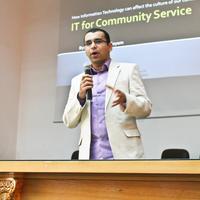






Uploads
Papers by Judit Kumuthini